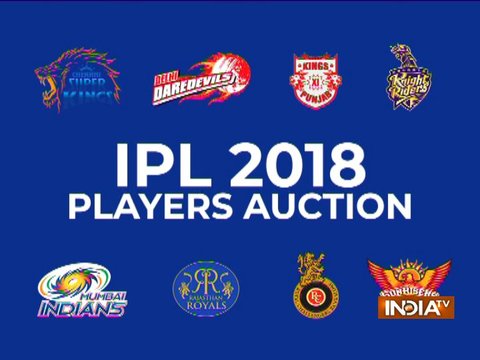

The IPL auction system has been widely criticised as “undignified and cruel” and “humiliating” to players. The New Zealand cricket board were the first to voice their disapproval of the auction. Heath Mills, chief executive of the NZ Cricket Players Association said,?”I think the whole system is archaic and deeply humiliating for the players, who are paraded like cattle for all the world to see.”
The IPL is regarded as the most lucrative career path for Twenty20 cricketers. However, Mills believes that the players’ willingness should not be equated to contentment about the system. Mills said, “There’s a lot of good things about the Indian Premier League and it’s been great for cricket but I’d like to see it mirror the rest of professional sport in the way they engage athletes. Some players do exceptionally well out of if but the vast majority would like to see the system changed. They would like to negotiate with coaches and owners behind closed doors.”

via Imago
The NZ cricket board is unhappy with the way the IPL auction is conducted
Mills’ main grouse lay with the players’ lack of control over their future. When the auction begins, the players are merely commodities, available to the highest bidder. He continued, “The players enter the auction not knowing where they are going, who their team-mates are going be, who’s managing them, who the owners are — no other sports league in the world engages players on that basis. We’ve seen some players play for five or six teams over the 10 years the league has been going. Coaches cannot build an affinity with players, they can’t build a long-term culture. Players’ associations around the world would like to see it change.”
ADVERTISEMENT
Article continues below this ad
According to Mills, supporters traditionally value a mix of continuity and new signings. However, the IPL’s popularity remains as high as ever, as it has integrated itself in the world cricketing calendar. Needless to say, the IPL has noticed the criticism from the rest of the cricketing world regarding the auctions.
So, IPL’s chief operating officer Hemang Amin proposed a draft system in place of the auction. The draft system is well established across a wide range of sports. He said, “Going forward, the thinking is that we will reduce, maybe not have mega auctions, but consider having a draft system for new players to come in, which acts as feeder system to teams. Hence, IPL Governing Council is thinking on the lines of how to cut down on the big auction and have the continuity with teams.”
ADVERTISEMENT
Article continues below this ad

For season 11, it was mandatory for teams to spend a minimum 75% of their purse before and during the auction. That 75% includes retentions and purchase of new players. The total purse available for all eight franchises was US $100 million, out of which $96.875 million was spent by the end of the auction.
ADVERTISEMENT
Article continues below this ad
The IPL also decided to reduce the number of unsold players compared to the previous big auction. This would reduce the number of players who are actively rejected during the auction process. Amin continued, “If you look at the 2014 auction, we had presented around 320 players then before going into the accelerated bidding process. This time, we have taken learnings from previous years. We presented 170 players of which around 120 were sold. So if you compare to 2014 when 200 players went unsold, this time it was 50 or 60 who went unsold. Also on day one, 70 out of 110 were sold. So we’re trying to reduce the number of unsold players.”
Whether these changes will satisfy the NZ cricket board as well as the other cricket boards remains to be seen.
ADVERTISEMENT
ADVERTISEMENT
ADVERTISEMENT
ADVERTISEMENT

